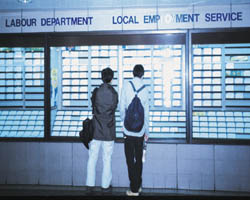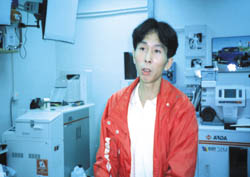 Online
Edition
Online
Edition | From
the editor Letters to the editor Milestone Answerman Periscope Campus Life Social Issues People Photo Features Education Channel Culture & Leisure Science |
| Last
Issue Archive |
| About
Varsity Advertise Media Links CUHK homepage JLM homepage |
Also
in Periscope
Exams
review
Related Links
Labour
Department
Department of Applied Social Studies of CityU
Hong Kong Institute of Vocational Education
![]()
|
|
Forsaken
students
Evaluation
of alternatives to postsecondary education
By
Arith
Leung & Eva Ling
Every
year, there are about 100,000 students who cannot continue their studies
after Form 6. The
government provides various postsecondary education schemes to further
their studies. The
Youth Pre-employment scheme and associated degrees are examples. The
Youth Pre-employment training aims at helping youths from 15 to 19 years
old to find jobs through pre-employment training, internships and
on-the-job training. Mr.
Dominic Chak is a labour officer in the Youth Pre-employment Training
Programme Office at the Labour Department. He
said that participants are expected to build up credentials and cultivate
good working habits. Participants
are also expected to identify their potential. Said
Mr. Chak: “About 97 percent of the trainees last year agreed that the
scheme was worth launching.” However,
not all trainees find jobs after finishing the training scheme. “About
40 percent of the trainees found jobs successfully last year and about 30
percent of the trainees decided to further their studies. “The
strengths of our graduated trainees include better working experience and
etiquettes,” said Mr. Chak. He
said these qualities are what matriculation leavers or university
graduates lack. He
said the scheme is not a guarantee for recruitment after graduation. “Whether
they can get a job in society depends on many other factors.” Participants’
efforts, their parents’ support and market forces are other factors. Some
scholars and education activists critcised such programmes. “These
programmes may only offer little help,” said Dr. Tse Wing Ling,
associate professor in the Department of Applied Social Studies at the
City University of Hong Kong. “Some
courses are impractical and incompatible with society’s needs,” he
said. “For example, there are many courses on bookkeeping, but the
market has already been saturated.” Mr.
Chui Yat Hung is the director of the Student Guidance Centre at the Hok
Yau Club. He
also said these programmes are not too helpful. He
said that the qualifications for entrance to these programmes are low. “Some
of them still lack recognition from professional bodies,” he said.
“And there are few chances that students will be admitted to degree
courses afterwards.” He
said the government has not set clear instructions. “Better
and clearer linkages or a credit transfer system between these
institutions and local universities should be set,” said Mr. Chui. He
said even the students themselves might reject these courses. “They
think the programmes will not do them any good,” said Mr. Chui. Mr.
Gary Leung recruits staff for a local Internet company, EHongKong.com.
Mr.
Leung said that he has heard of the scheme but is not familiar with it. “Academic
results are not the most important in our staff recruitment. “This
is because the major responsibilities for our posts are to make
homepages,” said Mr. Leung. He
thinks that working experience is the most essential. He
also said that a quick and creative mind is significant for homepage
making because it increases the competitiveness of the company. Mr.
Leung said he has interviewed many applicants who were in their early 20s. “Many
of them said that they wanted the job only because the profession could
provide chances to earn big money in the shortest time,” said Mr. Leung. Mrs.
Eva Chan is the head of a
garment factory. She
also said that she knows little about the post-secondary education
programs like Youth Pre-employment Training. However,
she said these programmes are good for youngsters. Mrs.
Chan said that education background is of little importance. “As
we do not offer on-the-job training to workers, they must have related
working experience beforehand,” said she. “Indeed,
we once employed several young, energetic guys with proper training in
vocational training institutes. “However,
their bad working attitudes made me fire them,” said she. She
said that they were late many days and smoked at work. “In
addition, they always used the factory’s telephone to chat for 2 to 3
hours,” said Mrs. Chan. Both
Mr. Leung and Mrs. Chan said that they would not treat graduates of the
pre-employment scheme differently. Mr.
Leung said that for those who do not get good results in public
examinations, post-secondary education schemes are definitely good
alternatives. “I
think more publication and promotional work should be done,” said Mrs.
Chan. Said
the Labour Department’s Mr. Chak: “We have delivered 100,000 letters
to local employers to inform them of the scheme.” He
said senior staff of the department arranged personal visits with
employers. “We
also hold seminars for human resources practitioners to get their
support.” “We
have had interviews with some local media like the Hong Kong Economic
Times,” added Mr. Chak. He
said that the Labour Department was actively seeking advice from different
sources to make the scheme better. ![]()
‘Losers’
not necessarily destined to fail
By Eric Leung
Mr.
Mui Kin Hoi, a 29-year-old owner of a photo studio, failed English in the
Hong Kong Certificate of Education Examination.
He managed to take some engineering courses at a technical institute. Mr.
Mui then worked at Hong Kong Telecom for about 10 years.
“Courses taken at a technical institute are practical, and I applied the
knowledge at Hong Kong Telecom,” said he.
He said postsecondary courses organised by the Labour Department fail to
help students.
“The employers do not allow them to practise because the internship is
short — say, only one month,” said Mr. Mui.
Mr. Mui said courses offered by technical institutes were more useful than
those offered by the department.
Regarding the education system,
Mr. Mui said the quality of teachers was a big concern.
“I think many people become teachers because their academic results are
poor,” said Mr. Mui.
“Teachers of low quality directly affect student performance, creating
to a vicious circle,” said Mr. Mui.
He said the curriculum should keep pace with social developments.
“The curriculum of the computer course teaches PASCAL, which is already
outdated,” said Mr. Mui.
Mr. Chow Chun Yin, 21,
has sat twice for the certificate examination. He scored one mark in his
first trial and three marks in the second trial.
He then studied in a computer school.
Mr. Chow is working as an assistant producer in Zuni Icosahedron, a
cultural collective in Hong Kong.
Mr. Chow has a different view of the Hong Kong Institute of Vocational
Education. He said that the scheme helped
students who get low marks, but it ignores those who get “no
marks”.
Mr. Chow agreed with Mr. Mui that the technical institute helps students
find jobs.
“Some of my friends who studied hotel management and accountancy at a
technical institute managed to find jobs with the institute’s
assistance,” said Mr. Chow.
Mr. Chow said that average performance in school should be equal in
importance to public examinations.
Said Mr. Chow: “Whether a student can make use of the knowledge he
learnt from school is more important.” ![]()
|
Arith
Leung
 Margaret Ng and Albert Chan express their views on laws for political parties. |
|
|
![]()
